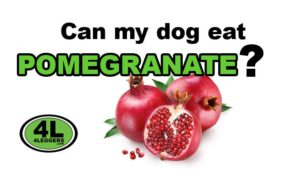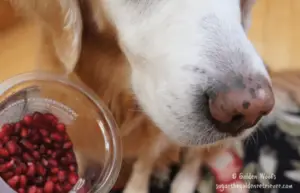Pomegranate fruits are popular because of their health benefits and are very nutritious when consumed by humans. They are filled with healthy antioxidants, which are essential for the human immune system. But, are pomegranates recommended for dogs or they are only healthy and nutritious to humans? Can dogs eat pomegranates? What happens when dogs eat a pomegranate? Is it healthy for your furry friend just like it is for humans, or is it extremely harmful and dangerous?
First off, if you’re here because your dog just ate a pomegranate; relax. Pomegranates are not toxic to dogs; however, in some cases, they can make your dog unwell. Worst case is your dog will be sick, from both ends. Some furry pets swear their dogs love them, but we would suggest staying away from pomegranate seeds if possible.
What is a Pomegranate?
Fresh, jewel-colored pomegranates are stunning fruits and seeds, which make an excellent garnish. Besides, pomegranate juice has increasingly become available in most local grocery stores. They are also a staple food, particularly in Persian cuisine. The seeds are the edible part of pomegranates due to their delicious citrusy taste. It’s nice to note that they are also rich in folic acid, vitamin C, fiber and potassium.
Can Dogs Eat Pomegranate?

Well, the issue of whether dogs can eat pomegranates is a frequent topic of discussion among many pet owners. You will find many pet owners talking about how much their furry friends love them and others claiming that they would never feed them with it. In such cases, it is advisable to ask yourself first why you would want to feed it to your dog.
Are you dying to share pomegranates with your canine friend because they are your favorite fruits? Or maybe you want your dog to benefit from the antioxidants in them? Whichever the reason, it is reasonable, but there can be better ways to do it. Here, we look at the benefits and dangers to make you understand all that you need to know before deciding whether to feed your canine friend with pomegranates or not.
Are Pomegranates Good for Dogs?
 Pomegranates are healthy fruits to humans as they contain more antioxidants than any type of berry. Scientific studies have revealed that the fruit provides anti-aging properties for humans.
Pomegranates are healthy fruits to humans as they contain more antioxidants than any type of berry. Scientific studies have revealed that the fruit provides anti-aging properties for humans.
Therefore, these fruits might provide some benefits for your dogs, but they might not be much as compared to humans. The fruit might also lead to stomach upsets for your dog; thus, we can’t advise you to feed him or her with it.
Why Can Feeding Dogs with Pomegranates Be a Bad Idea?
According to Smart Dog Owners, there is no proof that pomegranates can be poisonous or lethal to your dog. Therefore, if your pooch feeds on pomegranate without your knowledge, you do not need to panic.
Usually, pomegranates will cause your dog to experience tummy issues for a short while and may also vomit. The dog’s digestive system is not able to process fruit seeds effectively since it is not meant for a fruit-based diet. Therefore, pomegranates could be a whammy to the dog’s digestive system in its fruit form.
Why is it Not Advisable to Feed Your Dog Pomegranate Seeds?
There is no doubt that dogs can enjoy several health benefits from some vegetables and fruits. However, pomegranate seeds can be bad on the digestive system of your furry friend. The actual fruit is not actually poisonous, unlike other fruits like rhubarb and grapes, which are highly toxic to the canine family.
 Pomegranate seeds have high acidity levels that may be tough on the digestive system of your furry friend. As you may know, a dog’s digestive system is considered to be more sensitive as compared to that of humans.
Pomegranate seeds have high acidity levels that may be tough on the digestive system of your furry friend. As you may know, a dog’s digestive system is considered to be more sensitive as compared to that of humans.
Nevertheless, it is good to mention that eating pomegranate seeds may result in different reactions depending on the dog. It may affect some dogs very negatively and have no adverse effects on others. But to be on the safe side, it is advisable to avoid feeding pomegranate seeds to your dogs.
What Would Happen If You Feed Pomegranates to Your Dogs?
For humans, pomegranate seeds are healthy because they are rich in antioxidants. One of the major antioxidants in the fruits is tanoids or tannins. These compounds are unhealthy to your dogs in high concentrations, though they are very healthy to humans. Tannins consumption may lead to a number of side effects, which include diarrhea, vomiting, and stomach aches.
Disadvantages of Feeding Pure Pomegranates to Dogs
Almost every pet owner would want their furry friends to be just like them as they are very close to them. But the truth is that dogs are totally different from us, and their digestive needs are unique. Consequently, the healthy antioxidants that are beneficial to us do not perfectly suit your pup’s tummy.
Pomegranate fruits are rich in ellagic acids and anthocyanins and also tannins. Therefore, your furry friend may find it hard to take in these potent antioxidants at high levels. Moreover, pomegranates have many seeds that would require the dog to chew, making it uncomfortable for them. It would also be difficult for some dogs to digest the other part, which may be the cause of digestive problems.
What Should You Do If You Have Fed Your Dog Pomegranates Seeds Already?
 It is advisable to consult your veterinarian if your furry friend consumes pomegranate seeds. The most common side effect of consuming pomegranate seeds for dogs is vomiting. Therefore, it is recommended that you provide your pup with plenty of water if you spot any sign of negative effects. These effects may also include the dog experiencing diarrhea or loose bowel movements.
It is advisable to consult your veterinarian if your furry friend consumes pomegranate seeds. The most common side effect of consuming pomegranate seeds for dogs is vomiting. Therefore, it is recommended that you provide your pup with plenty of water if you spot any sign of negative effects. These effects may also include the dog experiencing diarrhea or loose bowel movements.
However, as mentioned above, some dogs may not experience any digestive or health issues from consuming pomegranate seeds. But, it is still a good idea to keep them away from your canine friends to protect them from any health complications. Therefore, you should keep your furry friend from the fruit’s seeds or any fallen parts of the fruit, especially the outer part.
How to Give Pomegranate to Your Dog?
Well, we now know the dangers of feeding pomegranate fruit to your dogs. But we would also like to provide some of the relatively safe ways to include pomegranate in your dog’s diet if you ever decide to do it. The following methods will allow you to provide healthy antioxidants to your pooch without causing any digestive complications.
Nevertheless, it is advisable to consult your veterinarian before you think of adding any new thing to your dog’s diet. Here are the three ways that you can do to give pomegranate to your dogs:
1. Pomegranate dog treats
One of the best ways to ensure that your pooch enjoys healthy antioxidants by consuming pomegranates is by giving them in the form of dog treats. This can be a very effective approach, especially if your dog loves the taste of this sweet fruit. The method involves giving high-quality treats that contain the fruit’s juice.
2. Pomegranate extract
According to recent studies, pomegranate extract offers a safe and effective way to help reduce the risks of heart disease in dogs. As you may know, heart disease is among the most common ailments that lead to dogs’ death. Therefore, pomegranate extract could be better to reduce the progression and even the onset of canine disease-induced oxidative stress.
You need to add a teaspoon of the extract to your pup’s food but with the permission of your veterinarian. This will help in boosting the levels of healthy antioxidants in your pet’s diet.
3. Pomegranate Juice
We have discussed the cons of feeding pomegranates to your dogs, but if you have to do it, then you need to know which part is safer for them. According to studies, the only part that is safe for your furry friend to feed on is the juice of the fruit. The other parts of the fruit may lead to digestive issues and are not even likely to be helpful to your canine friend.
Which Other Fruits are Healthy for Dogs?
As mentioned earlier, a dog’s digestive system is not meant for a fruit-based diet but there are some fruits that can offer some health benefits to your furry friend. Other than pomegranates, the other healthy fruits to your dogs include Persimmons and Apples.
 Persimmon
Persimmon
According to studies, persimmon is low in fats and calories as it provides 70 calories per 100 mg. However, the fruit contains high levels of dietary fiber and antioxidants. These healthy antioxidants include lutein, beta-carotene, cryptoxanthin, lycopene, zeaxanthin, and vitamin A.
The antioxidants combine to provide natural protection against oxidative stress-induced diseases as well as aging.
Apple
Apple may not be as popular as persimmon and pomegranate when it comes to many pet owners. However, the fruits are easy to find throughout the year due to their universal nature. Just like persimmon fruit, apples are also low in calories as they provide 50 calories per 100 mg.
Moreover, they are also free of cholesterol or saturated fats that are associated with triggering health complications. The fruit is also rich in dietary fiber that helps prevent the absorption of bad cholesterol or dietary-LDL in the gut. In addition, the dietary fiber ensures that the mucous membrane in the dog’s digestive system is not exposed to toxic substances. The fiber binds to the cancer-causing chemicals in the gut.
Finally, it is advisable to wash all fruits gently with some water and dish soap to get rid of harmful bacteria and debris before feeding them to your dogs. You should also start with providing your furry friend with a tiny portion of the fruit to gauge your pet’s interest in a particular fruit.






Hi there,
Quite the contrary, pomegranates have high nutritional value, therefore, it is great for dogs as a treat. I’m not sure why people think otherwise. Seeds and the skin itself should be avoidable for obvious reasons but the meat can be used to make pup treats as seen in this recipe here: https://goldenretrieverlove.com/can-dogs-eat-pomegranate/
Thanks a lot for the comment! I will ask our vet to take a look at this article.